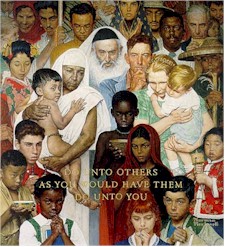5th Sunday of Easter - How Will They Know Us?
"This is how all will know that you are my disciples, if you have love for one another."
This is the heart of the Gospel message - the foundation stone of our Christian faith: love is a gift of God; when we learn to love, we experience God...and our love only reflects God when it is not focused on self but on others. Our love is only God-like when it is given unconditionally, and without being earned... and when it seeks no return.
 That sounds like an ideal that is almost impossible to attain, a quality to be found in exceptional persons of heroic virtue - yet in God's plan of things, it is just this kind of person that surrounds us with this God-like love all throughout our lives, whose eyes are those in which we see the reflection of God's love, who translates God's goodness into a voice that soothes and comforts, whose hands protect and caress, and whose example of patience and forgiveness make God's love real and tangible and intimately present in our lives.
That sounds like an ideal that is almost impossible to attain, a quality to be found in exceptional persons of heroic virtue - yet in God's plan of things, it is just this kind of person that surrounds us with this God-like love all throughout our lives, whose eyes are those in which we see the reflection of God's love, who translates God's goodness into a voice that soothes and comforts, whose hands protect and caress, and whose example of patience and forgiveness make God's love real and tangible and intimately present in our lives.
We learn that love is of God from one another.
Live on in my love - remember the things I have taught you - believe that I have told you all these things so that my joy may be in you, and so that your joy may be complete.
There is no greater love than this: to lay down one's life for one's friend. This is the kind of love that I have tried to give you from the first moment that you were in my womb to the moment I draw my last breath.
I pray that my love for you has taught you the meaning of real freedom, and has never been enslaving. I hope that, despite my human failings, you have learned to place love of others before love of self, so that you, in turn, might be authentic examples of the love of God for others.
His was pure, unselfish, unconditional love. It was not motivated by fear, or by any self seeking. His love was given freely, without being earned or merited. He loved sinner and saint, the rich and the poor, the learned and the simple. And he expected nothing in return.
When we examine our own relationship, both with God and with neighbor, we certainly realize how difficult it is for us to imitate the love of Jesus. Our love is very imperfect; it can be colored by fear, by some hidden motive, by selfishness. Often, our love is conditional... we only love those whom we like, or those who earn our love by pleasing us. Our love is fragile and sensitive. It withers and dies if we are hurt or misunderstood. Or we simply get tired of giving; we grow weary of preferring others to ourselves.
Again, we bump into the basic paradox that is at the heart of the Christian Gospel - death leading to life, darkness giving way to light, suffering as the road to glory. Unless and until we accept this fundamental condition, we will never understand the love we are called to share; we will never be fully at peace. We will continue to worry and fret, to question God's will and His love, to resent the predominance of evil, to slip easily into moods of doubt and despair.
If we take seriously the "new commandment" that Jesus leaves us, we have to keep examining the quality of our love, to see if it really reflects the kind of unselfish love that He spoke about and lived by. When Jesus says "Love another as I have loved you", it sounds deceptively simple and easy. But when we measure our love of God and neighbor against that "simple" rule, we find that we fall far short of that ideal most at the time.
Jesus our Shepherd says: "My sheep hear my voice; I know them and they follow me. I give them eternal life, and they shall never perish. Behold I make all things new."
The love of Jesus is modeled on the love of God. It is a human translation of that love - universal, unwavering, relentless. It will always be a challenge for us, an ideal for which we strive. Jesus Himself nourishes and purifies that love if we let Him day by day. And, our love will be finally and fully like His when we share the glory of His resurrection and see our God face to face.